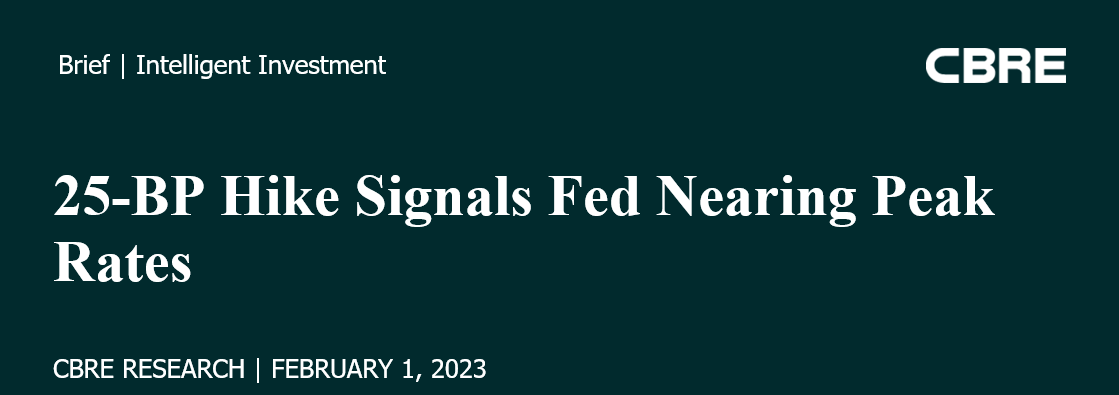
Executive Summary
• The Federal Reserve raised the federal funds rate by 25 basis points (bps) today to a range of 4.5% to 4.75%.
• Continued reduction of the Fed’s $8.5 trillion balance sheet by $95 billion per month may put upward pressure on long-term interest rates, making it more expensive to finance real estate investment.
• We expect the Fed will make one more 25-bp rate hike at its next meeting in late March, pushing the peak range to 4.75% to 5% for the rest of the year.
• We expect that investment activity will remain subdued in the first half of 2023 and restrictive monetary policy will increasingly weigh on broader market fundamentals as the year goes on.
February FOMC Meeting
The Federal Reserve increased the federal funds rate by 25 bps today to a range of 4.5% to 4.75%. We expect the Fed will make one more 25-bp rate hike in late March and the federal funds rate will then remain in a range of 4.75% to 5% for the rest of the year. The Fed also will continue its quantitative tightening campaign by reducing the size of its $8.5 trillion balance sheet by $95 billion per month.
The Fed today acknowledged inflation has eased and believes it is appropriate to continue increasing rates to reduce inflation to its 2% target rate. In short, the Fed emphasized its commitment to a dual mandate (price stability and full employment) and will consider a wide range of information in setting future monetary policy.
The Bottom Line
Tighter monetary policy is especially affecting industry sectors that are most sensitive to interest rates, including real estate, but the effects are rippling across the economy. Consumer and business spending have slowed, which combined with resolution of supply chain issues will enable inflation to cool enough to avoid further rate hikes after the one expected in March.
The Fed’s policy will temporarily cause less occupier demand for commercial real estate this year. With robust fundamentals for most sectors, except for office, the impact won’t be particularly acute. Consequently, CBRE expects a more typical downturn rather than a highly disruptive one like the Great Recession. Real estate investment activity will remain subdued during the first half of 2023. However, lower inflation and greater certainty on interest rates and economic growth should set the stage for a recovery later this year.